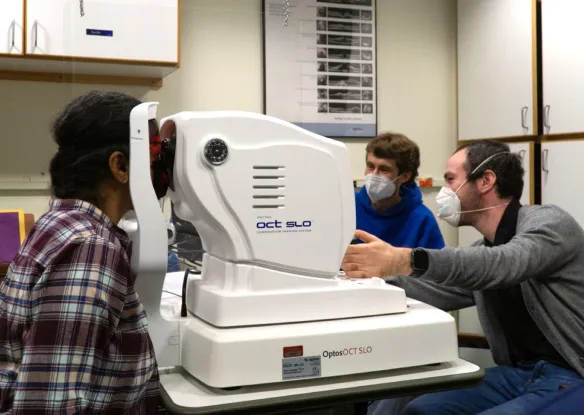
Principal Investigator:
Santani TengAvailable experiments in the Cognition, Action, and Neural Dynamics Lab. Portal to signup form
The Teng Lab for Cognition, Action, and Neural Dynamics at SKERI often seeks participants in our ongoing studies. Learn something about vision, hearing, touch, or movement while contributing to the scientific discovery process!
E-mail List: Sign up here to let us know you’re interested, and to stay in the loop about new participation opportunities! Your information is only used for occasional email announcements and NEVER released outside the lab.
What studies are currently running in the lab?
Recruiting: Proficient braille readers for EEG study (Click to expand)
The Cognition, Action, and Neural Dynamics Lab seeks participants for a neuroscientific study on braille reading. While you read a series of braille texts, we will track your fingers and brain activity using EEG, a common, non-invasive, and completely safe technology. Our goal is to learn more about how the hands and brain work together to read and understand tactile writing.
We would like to get to know all kinds of members of the Bay Area blind community, but for purposes of this study, we are looking for people who meet the following general criteria:
- Age 16 and up
- Blind from an early age with no history of visual print reading
- Proficient in Grade 2 contracted braille reading
- Comfortable sitting still for up to 3 hours (with breaks) and reading different braille texts
What to expect if you participate:
You will visit our lab facility at a mutually agreed time. While seated in a comfortable chair, you will wear a snugly fitting fabric cap fitted with the EEG electrodes. We will apply a safe, nontoxic conductive gel to each electrode that can be washed out of your hair afterward, either at the lab or at home. We will tape a small sensor to your braille reading fingertip(s). In this way we will measure your finger and brain while you read a series of texts printed on sheets of braille paper. In some cases you may be asked to read part or all of the text aloud. The entire experiment, including preparation, may take around 3 hours, divided into separate sessions if necessary.
Compensation:
Participants will be compensated $30/hour during the experiment, plus reasonable transportation expenses to get to and from the lab.
Contact Information:
If you are interested in participating or would like more details, please reach out to us in one of the following ways:
- by email at tenglab-studies@ski.org
- leave a voice message with your contact details at (415) 345-2299
- fill out our signup form at this link: https://forms.office.com/r/W6k9tMpg85
The research team will reach out as soon as possible.
What does participation involve?
More about our methods (Click to expand)
What kinds of studies do we do? The details depend on each individual experiment, which we will describe to interested participants during recruitment. Generally our experimental sessions are between 20 minutes and a few hours long (depending on the study) and involve some combination of the following methods:
- Lab computer-based experiments. Make judgments about sounds or images presented via VR, computer monitor, and/or headphones in our testing booths.
- Physical experiments. Use sound, vision or touch to make judgments about physical objects or environments.
- Mobility and locomotion. Move about a space in or near our institute, or move your head/body while stationary, to capture naturalistic ways of interacting with your real or virtual environment.
- Electroencephalography (EEG). Wear a cap fitted with electrodes and a conductive gel while we record electrical signals from your scalp in our lab.
- Magnetoencephalography (MEG). Some studies will be performed at the Biomagnetic Imaging Laboratory at UCSF’s Parnassus campus. Similarly to EEG, your brain activity will be recorded by a suite of sensors around your head, but they will be magnetometers in a solid housing rather than electrodes in a cap.
- Magnetic resonance imaging (MRI). For some studies we may collect an MRI scan to image the precise shape of your brain, also at UCSF’s imaging facilities.
- Virtual/remote data collection. Some perception experiments can be conducted online via web browser, and some virtual studies may involve simple survey data collection via web or phone. We may contact individual participants via the form linked above, or recruit using our platform on Prolific.com.
Where else can I volunteer for studies?
Other participation opportunities at SKERI
See here for other participation opportunities at SKERI outside our lab.





